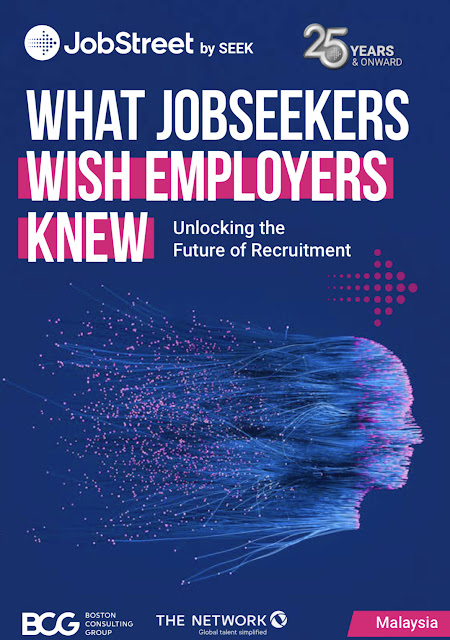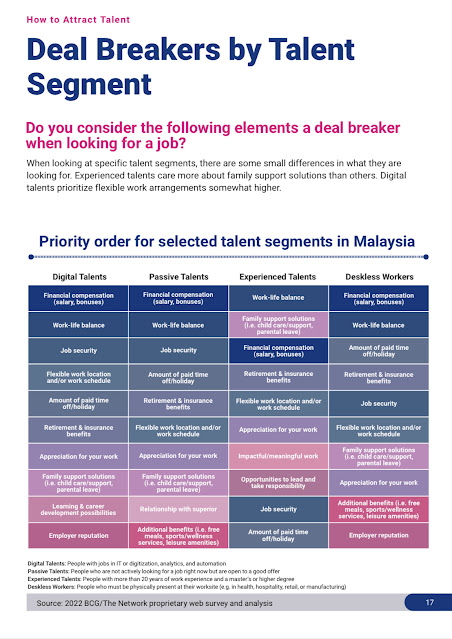2023 is expected to be a jobseekers' market in Southeast Asia and Hong Kong, according to SEEK, the parent company of Asia's leading online employment marketplaces JobStreet and JobsDB. A new study conducted by SEEK, BCG and The Network found that 34% of talent surveyed are actively looking for a new job, with the top three motivations being looking for a more interesting position, lacking opportunities for upward career progress and unsatisfied with salary and benefits.
The study found that 74% of talent around the region are approached multiple times per year about new job opportunities, and 36% of those in Malaysia are approached every month. Additionally, 70% of the region's respondents and 69% of Malaysians feel that they are in a strong negotiating position when looking for a job. This suggests that potential talents are confident to look out for new opportunities despite fears of recession.
Findings – The Malaysian Context
Top 3 most coveted talent (based on the percentage of respondents who are approached frequently with job opportunities) are in the areas of:
• Information Technology
• Digitisation, data science and artificial intelligence, and
• Education, such as teachers and trainers.
Some 61% of Malaysians also expressed their preference for hybrid working models, translating to 7% higher than the global average.
Peter Bithos, Chief Executive Officer, Asia, SEEK, commented on the findings, noting that the balance of power in the labour market tends to shift towards employers as hiring tightens. However, many organisations in Asia are still recovering from the pandemic, and it is still a jobseekers' market. Employers need to know how to attract, recruit and retain talent.
The survey revealed that IT roles are the most sought-after talent in Malaysia, Indonesia, Hong Kong, Philippines and Singapore, with job opportunities on a weekly and monthly basis. This is consistent with SEEK's observation of a 29% YoY increase in job ads for tech roles in the region, based on data from JobStreet and JobsDB platforms.
Talent’s Top Priorities
This is consistent with the deal-breakers listed by job applicants when searching for a new position, with 17% naming work-life balance as the second-most important factor (after financial remuneration, or 22%). Both the amount of paid time off and job security rank third on the importance scale for job seekers.
The expectations of people with regard to their jobs have drastically shifted in recent years, according to Sagar Goel, Partner and Associate Director at BCG. Most job searchers today choose to work in order to live rather than the reverse. Companies need to understand that while offering a competitive wage may attract sought-after talent, it won't keep them on the job long-term. Equally significant is a business culture that values positive working relationships and promotes flexibility and work-life balance.
"The Malaysian Government has been visionary in introducing the Malaysia Digital (MD) strategic initiative to encourage and attract companies, talents, and investment while enabling Malaysian businesses and the rakyat to play a leading role in the global digital revolution and digital economy," said Vic Sithasanan, Managing Director of JobStreet Malaysia. With the Digital Economy projected to contribute 25.5% of our country's growth domestic product (GDP) from the existing 22.6% by 2025, MD is poised to be a significant growth engine for Malaysia.
Digital and technological abilities will continue to be emphasised. Companies must adapt to these evolving expectations if they hope to attract top personnel with the capabilities that their companies need, which includes putting an emphasis on work-life balance and flexibility through hybrid work models. (As was already indicated, 61% of Malaysians like hybrid work patterns, which is 7% more than the average worldwide.)
Ideal Hiring Journey
The survey also debunked and proved several recruitment myths and gave insight into what jobseekers want in their recruitment journey,for instance:
• A smooth and timely process is the number one way for an employer to stand out during recruitment (67%), as 49% would refuse an attractive job offer if they face a negative experience.
• Recruitment platforms are the top channel used when applying for a job. Meanwhile, the best way to raise interest when someone is not looking for a job comes from a recommendation by a friend. Once they are interested, most will look for further information through social media and company websites.
• Advanced digital tools are not favoured even among the young generation. Many prefer to see personal interactions during the recruitment process, with only 24% stating they would becomfortable participating in an AI-led automated interview.
The report also offered suggestions for how employers could enhance the hiring procedure and the overall package they offer to applicants, including: how to get past their biases to expand their talent pool; how to adjust their strategy to different personas; how to get culture basics right; and more.
For more information on the reports in Asia, click here for Malaysia, Singapore, Hong Kong, Indonesia, Thailand, and the Philippines or you can also please visit: https://www.jobstreet.com.my/en/cms/employer/case-study/what-jobseekers-wish-employers-knew/








No comments:
Post a Comment